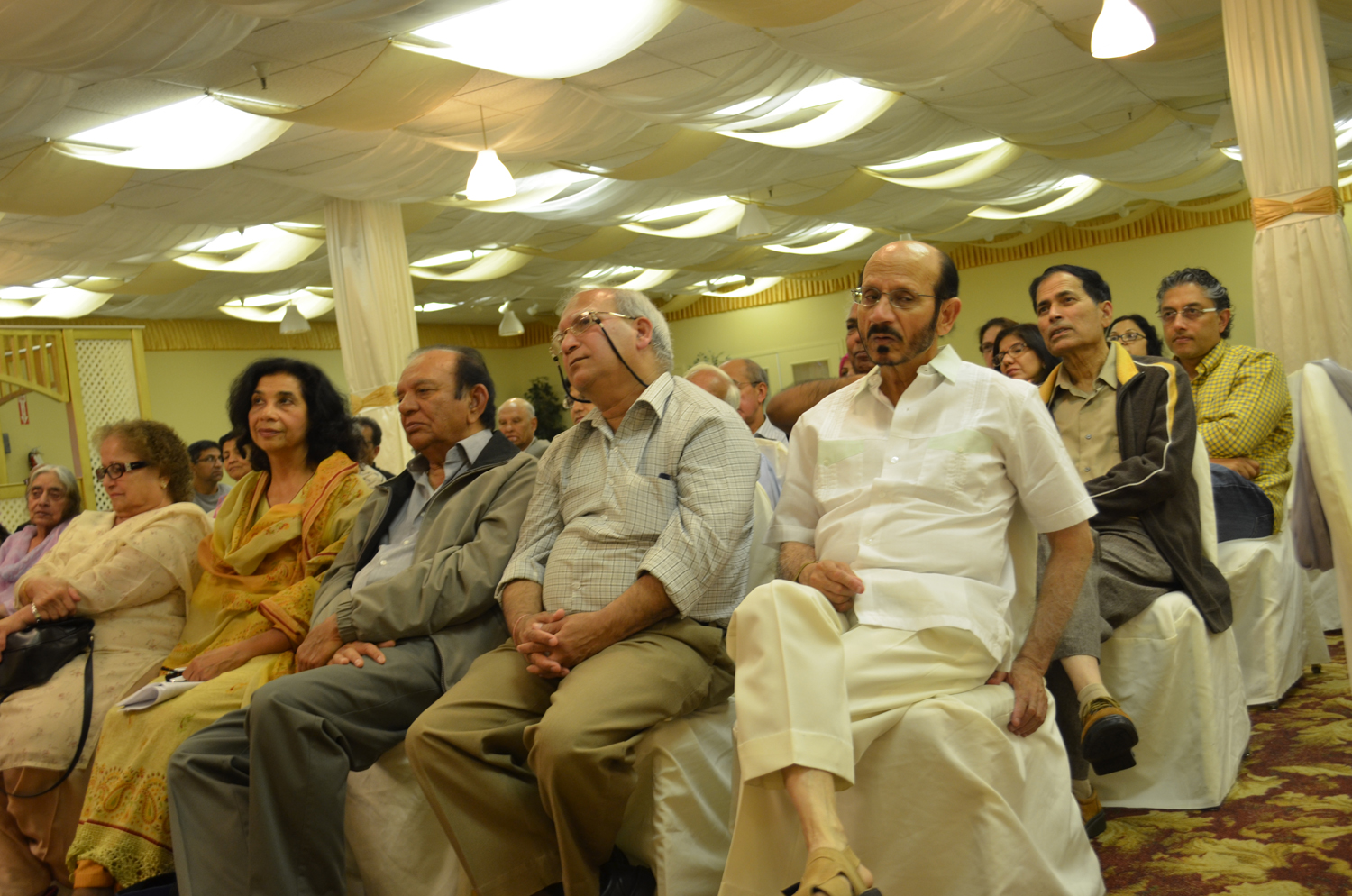|
By Abdus Sattar Ghazali
Urdu Academy of North America's May 20, 2012 monthly event was dedicated to the life and work of two great Urdu poets Mirza Yaas Yagana Changezi and Yosuf Zafar.
The event, held at the Chandni Restaurant in Fremont/Newark, Vijay Nigam sahiba, the daughter of a traditional poet, Farhat Kanpuri (Ganga Dhar Nath Nigam - 1905-1952). It may be pointed out that Vijay Nigam published her loving father's diwan "Narm JhoNkoN Kii Sada" in 2008, almost 56 years after Farhat sahib's death. 
Prof. Lubna Manzar, a poetess, was the MC of the first session that was devoted to the life and work of Mirza Yaas Yagana Changezi. Prof. Lubna presented a well-researched maqala on the life and work of this great poet.
As usual a number of Urdu lovers recited the poetry of Mirza Yaas Yagana Changezi which included: Hatem Rani, Shahzad Baseer, Meraj Sultana Ghazali, Mukesh Kackar, Ishaq Nagpurwala , Abdus Sattar Ghazali, Talat Khan and Ahmar Shahwar.
Mirza Yaas Yagana Changezi was one of the most important Urdu poets of the twentieth century and indeed among the masters of Urdu poetry. Real name was Mirza Wajid Hussain (chronological name Mirza Fazl ali Baig)[1]. He was born in Azeemabad, now Patna (Bihar) in 1884.
He was an iconoclast and rebellious by nature. Seeing Ghalib's extreme veneration, he took to demolishing Ghalib's iconic status and that earned him hostility of his contemporaries in Lucknow and elsewhere. He was ostracized and harassed for his views and writings. Finally he was declared apostate and went through extreme kind of humiliation at the hands of people in Lucknow. The place and people he had so fondly adopted that he changed his Name from Yaas Azeemabadi to Yagana Luckhnawi. He himself writes:
Watan ko chhod kar jis sar zameen se dil lagaya tha
Wohi abkhoon ki pyaasi hui hai Karbala ho kar
(Having left the motherland, gave heart to the place which has now become thirsty of my blood like Karbala).
He died on the night of 2 February 1956 after battling through long illness and loneliness in later years of his life. According to Najeebuddin Jamal while quoting Malik Ram, a famous Urdu Scholar says that Yagana had lost his mental balance in his later years and held Yagana's contemporaries and people of Lucknow responsible for it. Yagana himself was aware of the condition and wrote about it in one of his letters.
Yagana’s first collection of poetry was Nashtar-i-Yaas, which appeared in 1914 when he was 30 years of age,. His second collection was Aayat-i-Wijdani, which was published in 1927. In 1933 came Tarana, and in the years 1934 and 1945, the second and third edition of Aayat-i-Wijdani appeared. Each edition of Aayat-i-Wijdani was a bit enlarged, in 2003 Kulliyat-i-Yagana was compiled by Pakistani scholar and writer Mushfiq Khwaja and has the opinion that Yagana or his publishers appeared to be naive regarding the art of presentation. Thus, Yagana has four collections of poems to his credit: Nishtar-i- Yaas (1914), Tarana (1933), Aayat-i-Wijdani (1927) and Ganjina (1948), besides his works in prose, including Ghalib-Shikan.
Many literary critics say that Yagana was not only an important poet he was immensely gifted poetic genius, equal only to masters of poetry like Mir, Ghalib, and Iqbal, whose contemporaries could not accept his writings and ideas and he was not well taken rather misunderstood and misinterpreted by his detractors. His following couplets which are referred to as anti-religion are in no way a statement against religion and Persian and Urdu poetry is full of similar kind of verses.
Khudi ka nasha charhha, aap main raha na gaya
Khuda banay thay Yagana, magar bana na gaya
Sab terey siwa kafir, Aakhir iss ka matlab kya
Sar phira dey insaan ka, Aisa khabt-e-mazhab kya
Continued on next page
|